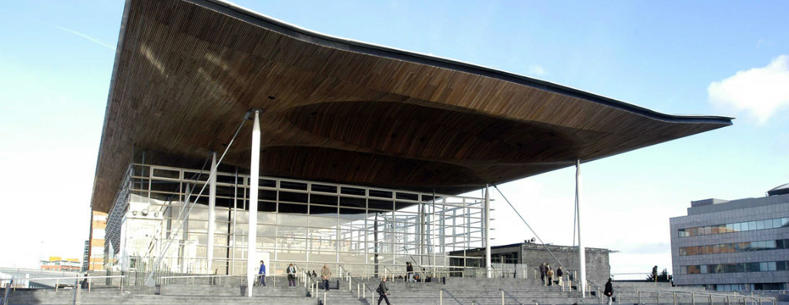An increasing number of laws for Wales are being made in Westminster, rather than by the Senedd. According to the Senedd’s Legislation, Justice and Constitution (LJC) Committee, this is leading to a post-devolution democratic deficit.
The Committee was established on 26 May 2021. Its remit includes looking at the quality of legislation, devolution, the constitution (including Wales’s constitutional future), justice, international affairs, and intergovernmental and interparliamentary relations.
Why is more legislation for Wales coming from Westminster?
UK legislation, passed by the UK Parliament, is sometimes used by the Welsh Government to introduce law for Wales in devolved areas. This is done by the legislative consent procedure, also known as the Sewel Convention.
This is the set of processes and procedures that allow a devolved legislature to decide whether to grant or refuse its consent to a UK Bill that covers some part of devolved powers. The Welsh Government will publish a legislative consent memorandum (LCM) relating to a particular UK Bill, explaining which clause, or clauses, require consent, and setting out the reasons for granting that consent, or for withholding it. Senedd Members then vote on a motion on the LCM, and decide whether or not the Senedd should give its consent.
Senedd decisions on legislative consent are not binding. The Convention is that the UK Parliament will not normally legislate if a devolved legislature withholds its consent, but it can chose to do so if it wishes.
The LJC Committee is concerned about the increasing number of UK Bills being used by the Welsh Government to make laws in devolved areas. The Committee highlights UK legislation on the environment, leasehold reform and building safety as areas that, in its view, should have been made using Welsh Government Bills in the Senedd, rather than through UK Bills.
The Welsh Government told the LJC Committee in October 2021 that its general principle remains “that it should legislate in the Senedd in devolved areas,” rather than using UK Bills. However, it also argues that in certain circumstances it is sometimes necessary to use UK Bills. This includes when there is no time available for similar provisions to be brought forward in the Senedd, where the “interconnected” nature of the relevant Welsh and English administrative systems mean it is most effect to take forward measures in one Bill, and where devolved provisions in question are minor or technical in nature.
Why is the LJC Committee concerned?
Between May 2021 and August 2022, the LJC Committee considered 44 LCMs and supplementary LCMs (SLCMs) relating to 21 UK Bills, and produced 30 reports. As of November 2022, the Committee had considered over 50 LCMs/SLCMs.
During the whole five years of the Fifth Senedd, the LJC’s predecessor committee considered 48 LCMs and SLCMs relating to 32 UK Bills, and produced 33 reports.
As well as this significant increase in the number of LCMs, the LJC Committee also say that consent is being sought for more clauses and schedules within individual Bills than in previous years.
A democratic deficit?
The LJC Committee argue that the increased use of the legislative consent procedure to legislate for Wales damages scrutiny on two levels.
Firstly, an LCM only leaves Senedd Members with an “all or nothing” decision when voting on the legislation. This is in contrast to the multi-stage scrutiny process a Welsh Government Bill goes through, with opportunities for amendment and extensive debate.
Secondly, the Committee argues that there is no role for the Senedd to influence the Welsh Government’s decision on whether it should pursue provisions in a UK Government Bill in the first place.
If this continues, the Committee warn that “there is a danger that it could undermine the Senedd as a legislature and the underlying principles of devolution.” The Counsel General, Mick Antoniw, told the LJC Committee in June that the Welsh Government’s ultimate view is that Sewel should be justiciable, and that there should be a “proper mechanism” for deciding on its application.
What else has the LJC Committee been working on?
The Committee scrutinised two Bills between May 2021 and August 2022: the Tertiary Education and Research (Wales) Bill and the Welsh Tax Acts etc. (Power to Modify) Bill. While acknowledging that it is difficult to draw broad conclusions through such a small number of Bills, the Committee identified some commons themes in its scrutiny.
A key concern is that significant policy development and implementation is often left to be determined by subordinate rather than primary legislation, particularly with regards to the Welsh Tax Acts Bill. The balance of legislation is tilted too much in favour of executive power, which marginalises the democratic mandate of the Senedd and delegates extensive powers to Welsh Ministers.
The Committee also held a roundtable event on 13 June 2022 to discuss the increasing complexity of the legal landscape in Wales. Academics discussed with the Committee the increased reliance on Sewel and non-legislative intergovernmental agreements and processes, and how this has changed post-Brexit.
External affairs
The LJC Committee is responsible for UK-EU governance, including ensuring compliance with the Trade and Cooperation Agreement and Withdrawal Agreement. This work has included mapping the responsibilities of the Welsh Government, scrutiny of the Northern Ireland Protocol Bill and alignment and divergence around retained EU law. It recently submitted evidence to the House of Lords European Affairs Committee’s inquiry into the future UK-EU relationship. LJC also sends representatives to the UK-EU Parliamentary Partnership Assembly.
During its first year, the Committee also assessed the impact on Wales of 29 international agreements. It reports regularly to the Senedd and shares its findings with the House of Lords International Agreements Committee.
The devolution of justice policy
In 2019 the Commission on Justice in Wales concluded that “justice should be determined and delivered in Wales”, and that the Senedd should take a more proactive role in the scrutiny of the justice system in Wales.
As part of this work, the LJC Committee held evidence sessions over the last year with the President of Welsh Tribunals, Lord Thomas of Cwmgiedd, the former Chair of the Commission on Justice in Wales and members of the Law Council of Wales.
The LJC Committee will continue its scrutiny of justice going forward, including monitoring the Ministry of Justice’s progress in responding to the Commission’s recommendations during a future evidence session.
A forward look
The LJC Committee continues its work, with its Chair recently joining parliamentarians from across the UK to discuss common challenges at the Interparliamentary Forum. It maintains its scrutiny of Bills, with the Counsel General due to give evidence on the Senedd’s first consolidation bill on 14 November. This Bill would consolidate the legal landscape around the historic environment in Wales into one accessible and bilingual piece of legislation. The Committee will also continue to monitor the Welsh Government’s approach to using UK Bills to legislate in devolved areas.
The Senedd will debate the LJC Committee’s Annual Report in Plenary on Wednesday 9 November.
Article by Philip Lewis, Senedd Research, Welsh Parliament






